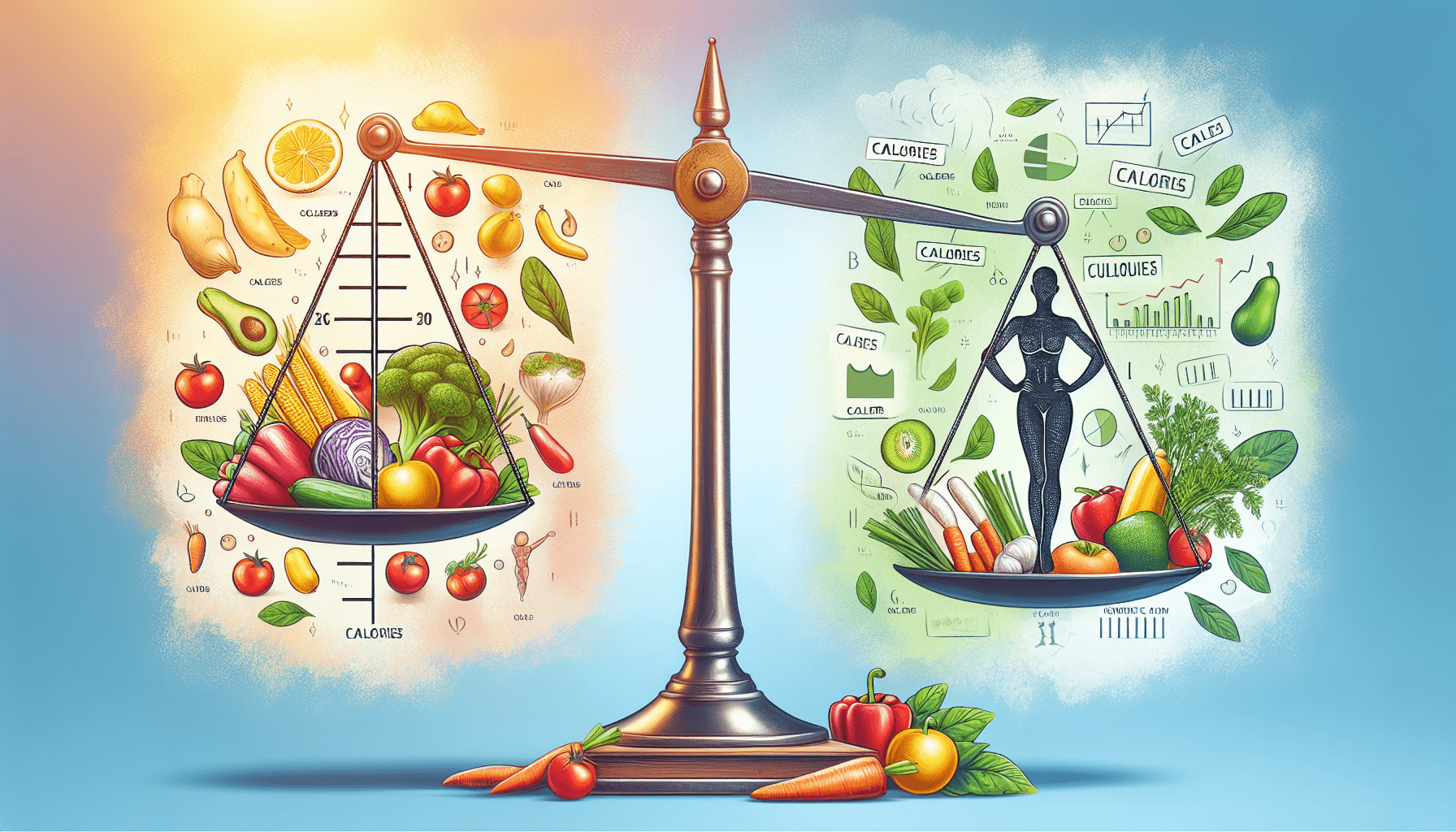
Are you looking to shed a few pounds but find yourself unsure of how many calories you should be consuming? Look no further! In this article, we will explore the question that’s on everyone’s mind: “How many calories should I eat to lose weight?” By understanding the science behind weight loss and calories, we can help you find the perfect balance that will lead you to your desired weight loss goals. So grab a healthy snack, sit back, and let’s embark on this calorie-counting adventure together!
Determining calorie needs
Basal metabolic rate (BMR)
Your basal metabolic rate (BMR) refers to the number of calories your body needs to function at rest. It accounts for the energy required to maintain essential bodily functions such as breathing, circulation, and cell production. Determining your BMR is the first step in understanding your calorie needs for weight loss.
Physical activity level
Your physical activity level greatly influences your daily calorie needs. Activities such as walking, exercising, and even standing burn additional calories. To determine your total daily calorie expenditure, consider the intensity and duration of your physical activities.
Weight loss goals
Your weight loss goals play a vital role in determining your calorie needs. The amount of calories you consume should be less than the number you burn to create a calorie deficit, leading to weight loss. Setting realistic and achievable weight loss goals is crucial to ensure long-term success.
Calculating calorie deficit
Creating a daily calorie deficit
To lose weight, you need to create a calorie deficit by consuming fewer calories than you expend. A deficit of 500-1000 calories per day is often recommended for gradual and sustainable weight loss. By consistently maintaining this deficit, you can expect to lose approximately 1-2 pounds per week.
Rate of weight loss
The rate at which you lose weight may vary depending on various factors, including your calorie deficit and individual metabolism. Rapid weight loss can have negative implications on your health. It is generally recommended to aim for a gradual and steady weight loss of 1-2 pounds per week.

Factors to consider
Age
As you age, your calorie needs tend to decrease. This is primarily due to a decrease in muscle mass and a decline in metabolic rate. Adjusting your calorie intake based on age can ensure that you are providing your body with the appropriate energy it needs.
Gender
Men and women have different metabolic rates and body compositions, which means their calorie needs may differ. On average, men tend to have a higher daily caloric requirement due to a larger muscle mass and higher metabolic rate.
Body composition
Your body composition, specifically the ratio of muscle to fat, impacts your calorie needs. Muscle is more metabolically active than fat, meaning it burns more calories at rest. If you have a higher muscle mass, you may require more calories to maintain your weight compared to someone with a higher percentage of body fat.
Health conditions
Certain health conditions, such as thyroid disorders or hormonal imbalances, can affect your metabolic rate and therefore your calorie needs. Consulting with a healthcare professional is important to consider any health-related factors that may influence your weight loss journey.
Metabolic rate
Your metabolic rate, determined by genetics and lifestyle factors, plays a significant role in determining your calorie needs. Some individuals naturally have a higher metabolic rate, allowing them to burn calories more efficiently. Understanding your metabolic rate can help you assess your calorie needs more accurately.
Potential risks of drastic calorie restriction
Nutrient deficiencies
Drastically reducing your calorie intake without proper planning and guidance can lead to nutrient deficiencies. It is important to ensure that you are consuming a balanced diet that provides all the essential nutrients your body needs to function optimally.
Muscle loss
Severe calorie restriction can lead to muscle loss, which can negatively impact your metabolism and overall body composition. Incorporating strength training exercises and consuming adequate protein can help preserve muscle mass during weight loss.
Slowed metabolism
Drastic calorie restriction for prolonged periods can lead to a slowed metabolism, making it more challenging to lose weight in the long run. Gradual calorie reduction and regular exercise can help mitigate this issue and maintain a healthy metabolic rate.

Safe and sustainable weight loss
Gradual calorie reduction
Rather than resorting to drastic calorie restrictions, it is advisable to reduce your calorie intake gradually. Aim for a moderate calorie deficit to achieve sustainable weight loss and minimize the negative impacts on your metabolism and overall health.
Balanced diet
Focusing on a balanced diet that includes a variety of nutrient-dense foods is essential for safe and sustainable weight loss. Incorporate fruits, vegetables, lean proteins, whole grains, and healthy fats into your meals to ensure you are meeting your nutritional needs.
Regular exercise
In addition to creating a calorie deficit through diet, regular exercise is crucial for weight loss and overall health. Engaging in a combination of cardiovascular exercises and strength training can help burn calories, build muscle, and boost metabolism.
Behavioral changes
Weight loss is not just about calorie counting; it involves making sustainable behavior changes. Focus on mindful eating, portion control, and developing healthy habits to ensure long-term success and weight management.
Importance of tracking calories
Food diary
Keeping a food diary can be an effective tool in tracking your calorie intake. By documenting what you eat and drink, you gain insight into your eating habits and can identify areas for improvement.
Calorie counting apps
Calorie counting apps can simplify the process of tracking your calorie intake. These apps often provide a database of foods and their corresponding calorie values, making it easier to monitor your daily intake and stay within your desired calorie range.
Portion control
Understanding portion sizes is crucial for accurate calorie tracking. Use measuring cups, scales, or visual comparisons to ensure you are consuming appropriate portions. Estimating serving sizes can lead to inaccuracies in your calorie tracking.
Seeking professional guidance
Consulting a registered dietitian
If you are unsure about determining your calorie needs or need guidance with weight loss, consulting a registered dietitian can provide you with personalized advice and support. They can help create a customized plan based on your specific needs and goals.
Medical supervision
For individuals with specific health conditions or on certain medications, medical supervision may be necessary while embarking on a weight loss journey. Consulting with a healthcare professional can ensure that your weight loss efforts are safe and suitable for your unique circumstances.
Personalizing your calorie needs
Trial and error
Finding the ideal calorie intake for weight loss is often a process of trial and error. It may take some time to determine the precise amount of calories that works best for you. Pay attention to your progress, how your body responds, and make adjustments accordingly.
Adjusting based on progress
As you progress with your weight loss journey, it is important to reassess your calorie needs. As you lose weight, your BMR may decrease, requiring a slight adjustment in your calorie intake to continue progressing towards your goals.
Lifestyle changes for weight management
Building healthy habits
Weight management is not just about losing weight; it involves building healthy habits for long-term success. Incorporate regular physical activity, mindful eating, and adequate sleep into your lifestyle to maintain a healthy weight.
Long-term sustainable approach
Adopting a long-term sustainable approach to weight management is essential. Instead of relying on short-term fad diets or quick fixes, focus on lifestyle changes that you can maintain in the long run. This will help you achieve lasting results and prevent weight fluctuations.
Conclusion
Determining your calorie needs for weight loss is a personalized process that requires considering factors like your BMR, physical activity level, weight loss goals, and various individual characteristics. It’s crucial to create a calorie deficit and prioritize gradual and sustainable weight loss to avoid complications. Tracking your calorie intake, seeking professional guidance when needed, and making sustainable lifestyle changes are key elements for successful weight loss and long-term weight management. Remember, a balanced diet, regular exercise, and behavioral changes are the foundation for a healthy and fulfilling weight loss journey.













Leave a Reply